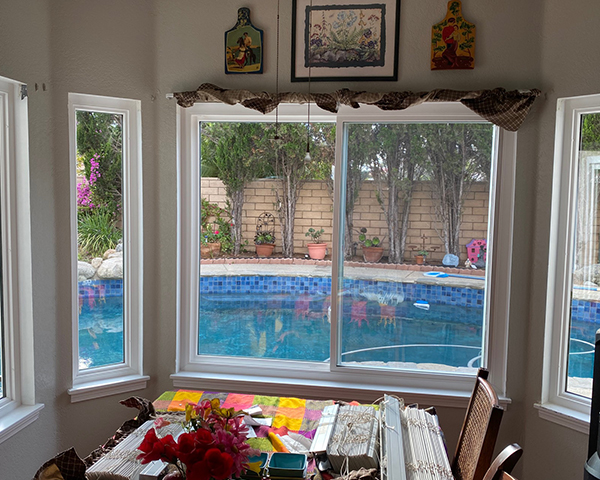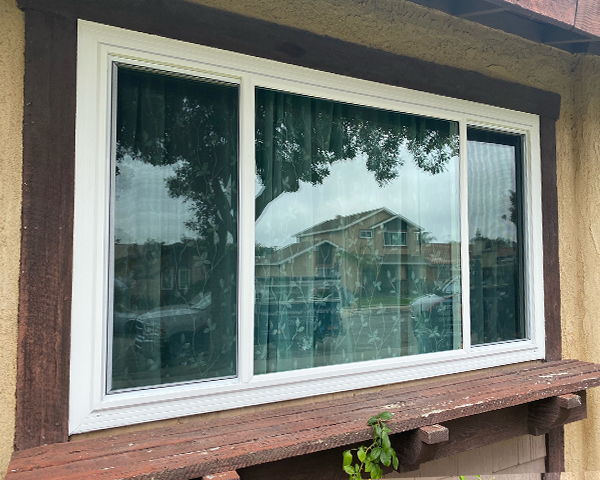Expert Answers
Have questions about windows?
Our Window FAQs cover everything from installation to maintenance and energy efficiency. Find expert answers and helpful tips to make informed decisions for your home.

Vinyl windows can be a good choice for many homeowners, as they offer several benefits, including:
- Energy efficiency: Vinyl windows are known for their energy efficiency, as they are able to prevent heat transfer and provide insulation. This can help to reduce energy bills and make your home more comfortable.
- Durability: Vinyl windows are made from a strong and durable material that is resistant to weather, water damage, and rot. This makes them a low-maintenance option that can last for many years.
- Affordability: Compared to other window materials, such as wood or aluminum, vinyl windows are generally more affordable, which can make them a cost-effective option for homeowners.
- Style options: Vinyl windows are available in a wide range of styles, colors, and finishes, so it is easy to find a design that fits your taste and the style of your home.
However, it is important to note that not all vinyl windows are of the same quality. Some vinyl windows are made from lower-quality materials that may not be as durable or energy efficient as others. It is important to research different brands and compare prices, quality, and warranty information before making a purchase.
In general, if you are considering vinyl windows, it is a good idea to choose a high-quality, energy-efficient product from a reputable manufacturer to ensure that you are getting a good-quality product that will last for many years.
Yes, double pane windows can make a significant difference in terms of energy efficiency, comfort, and noise reduction.
Double pane windows, as the name suggests, have two panes of glass separated by a gap filled with air or gas. This design provides better insulation than single-pane windows, reducing the amount of heat transfer between the interior and exterior of the home. This means that in the winter, heat is less likely to escape through the windows, and in the summer, hot air is less likely to enter the home.
The insulating properties of double pane windows can also help reduce energy costs, as heating and cooling systems don’t need to work as hard to maintain a comfortable temperature inside the home.
In addition to energy efficiency, double pane windows can also help reduce noise from outside. The extra layer of glass and air or gas in between can help block out noise, creating a quieter and more peaceful indoor environment.
Overall, double pane windows are a popular choice for homeowners who are looking to improve their home’s energy efficiency, comfort, and noise reduction.
In general, installing vinyl windows is unlikely to significantly decrease the value of your home. In fact, replacing old or outdated windows with new, energy-efficient vinyl windows can actually improve the overall value of your home.
New windows can enhance the appearance of your home, making it look more attractive and well-maintained, which can be appealing to potential buyers. They can also improve the energy efficiency of your home, reducing your energy bills and making it more comfortable to live in.
Additionally, vinyl windows are relatively low-maintenance, which can be attractive to buyers who are looking for a home that is easy to care for. They are also durable and long-lasting, so they can provide many years of use without requiring extensive repairs or replacement.
It is important to keep in mind that the value of your home is determined by a number of factors, including location, size, age, and overall condition. So, while new vinyl windows may enhance the value of your home, they are just one of many factors that can impact its overall value.
If you are concerned about the impact of new windows on the value of your home, it may be a good idea to speak with a real estate agent or a home appraiser for a professional opinion. They can give you a better understanding of how new windows may affect the value of your home in your specific market.
Vinyl windows can last a long time, typically between 20 to 40 years or more depending on the quality of the vinyl used, the climate they are installed in, and how well they are maintained. Higher quality vinyl windows tend to last longer, and those that are well-maintained can last even longer than the average lifespan.
Proper maintenance can include regular cleaning and lubrication of the window components, as well as ensuring that the window frames are not exposed to excessive moisture or extreme temperatures. Regular inspections for damage or wear can also help extend the life of vinyl windows.
It’s worth noting that the lifespan of vinyl windows can also depend on other factors, such as the quality of installation, the type of glass used, and the frequency of use. In general, however, vinyl windows are a durable and long-lasting option for homeowners.
The cost to replace a window can vary greatly depending on several factors, including the size of the window, the type of window, the material used, and the complexity of the installation. On average, you can expect to pay $1000 or more per window, including labor, depending on the specific circumstances.
In some cases, the cost of replacing a window may be higher if special equipment or materials are required, or if the installation is particularly complex. On the other hand, if you are replacing a standard-sized window with a pre-fabricated or vinyl replacement window, and you are able to install it yourself, you may be able to save money on the overall cost.
There are several types of windows that are considered to be highly efficient. Here are some of the most efficient types of windows:
- Low-E (low-emissivity) windows: Low-E windows have a coating on the glass that reflects heat and blocks UV rays, reducing heat gain in the summer and heat loss in the winter. This can improve energy efficiency and reduce heating and cooling costs.
- Gas-filled windows: Windows that are filled with a gas such as argon or krypton are more energy efficient than air-filled windows, as the gas provides better insulation and reduces heat transfer.
- Insulated vinyl windows: Vinyl windows are often more energy efficient than other types of windows, as vinyl is a poor conductor of heat and has insulating properties. Insulated vinyl windows have multiple chambers within the frame, which helps to reduce heat transfer and improve energy efficiency.
- Double-pane windows: Double-pane windows with low-E coatings and gas fills can also be highly energy efficient, providing good insulation and reducing heat transfer.
It’s important to note that the efficiency of a window also depends on factors such as the quality of installation, the type of frame material, and the climate and orientation of the building. Consult with a professional to determine the most efficient type of window for your specific needs.
Vinyl windows have limitations in terms of size. Vinyl is a flexible material and it can become distorted or misshapen if it is made too large. This can impact the functionality and appearance of the window, and may also affect its energy efficiency.
As a result, vinyl windows are typically limited to smaller sizes, such as standard double-hung or slider windows. If you need a larger window, you may need to consider other materials, such as wood, fiberglass, or aluminum. These materials are stronger and more rigid, and can be made into larger sizes without sacrificing performance or appearance.
It is also important to keep in mind that larger windows may require more structural support, such as extra framing or reinforcement, to ensure that they are stable and secure. This can add to the cost of the window replacement project and may require the services of a professional contractor.
So, while vinyl windows have limitations in terms of size, they can still be a good choice for many homeowners, especially if you are looking for a cost-effective, low-maintenance solution for smaller windows. Just be sure to research your options and consider the specific needs and requirements of your home before making a decision.
Retrofit windows can be a cost-effective solution for replacing windows. Retrofit windows are designed to fit into the existing frame of your current windows, reducing the need for extensive installation work. This can save you time and money compared to traditional window replacement methods.
Retrofit windows are also easier to install because they do not require any changes to the existing window frame, which can reduce the cost of labor. Additionally, because the existing frame is preserved, you may be able to reuse some of the trim and molding, further reducing costs.
However, it is important to note that retrofit windows may not be suitable for all types of windows or homes. If your current windows are in poor condition or have extensive damage, retrofit windows may not provide the level of performance and energy efficiency you need.
Cheap spacers used in double pane windows can potentially cause them to fail. Double pane windows consist of two panes of glass separated by a spacer, which creates an insulated air space between the panes. The spacer helps to maintain the distance between the panes and prevent them from flexing, which can lead to stress cracks and seal failure.
Low-quality or cheap spacers can be made from materials that are less durable, such as aluminum or certain types of plastic. These materials may be more prone to bending, warping, or breaking, which can cause the panes to shift and break the seal. When the seal fails, moisture can enter the space between the panes, causing condensation, fogging, or even mold growth.
In contrast, high-quality spacers are typically made of materials such as stainless steel or structural foam, which are more durable and less prone to damage. They can also incorporate additional features such as desiccants, which help to absorb moisture and prevent condensation from forming.
It’s important to choose a reputable window manufacturer and installer that uses high-quality materials, including spacers, to ensure the long-term durability and performance of your double pane windows.
While it is not always necessary to replace all windows at once, there are several benefits to doing so.
- Consistency: Replacing all windows at once can ensure that your home’s exterior appearance is consistent, as new windows will have the same style, color, and design. This can enhance your home’s curb appeal and increase its overall value.
- Efficiency: Replacing all windows at once can also improve your home’s energy efficiency, as new windows will be more effective at blocking drafts and reducing heat transfer. This can lead to lower energy bills and a more comfortable indoor environment.
- Cost savings: Replacing all windows at once may be more cost-effective than replacing them in stages, as you can often negotiate a better price with a contractor for a larger job. Additionally, replacing all windows at once can help you avoid paying for labor costs and other expenses multiple times.
- Convenience: Replacing all windows at once can be more convenient than replacing them in stages, as you only need to go through the installation process once. This can reduce the disruption to your daily routine and make it easier to plan around the installation process.
Of course, every situation is unique, and there may be valid reasons to replace windows in stages. For example, if budget constraints are a concern, you may want to prioritize replacing windows that are most in need of repair. It’s best to consult with a professional to assess your specific needs and determine the best course of action.

